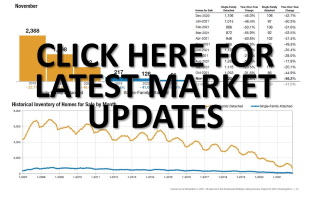RE/MAX National Housing Report for January 2022
Prices Remain Steady as Home Sales Decline Seasonally and Inventory Stays Low
DENVER — January home sales dropped 31.4% from December’s total – a decrease slightly more than the seasonal norm – as inventory shrank for the sixth consecutive month. Year over year, sales were down 5.3% from January 2021.
A December-to-January decline in home sales is typical and expected. In the past five years (2017-2021), the average drop in home sales between the two months was 28.0%.
Across the 51 metro areas in the report, the Median Sales Price remained steady as January was the second month in a row of little-to-no month-over-month price increase. January's Median Sales Price equaled December’s $335,000, which was only $5,000 below the report’s all-time high of $340,000 set in October 2021. However, year-over year price increases remain steep as January’s price was 15.9% higher than a year ago.
Inventory remains historically low. November, December and January have each reset the mark for lowest inventory (in terms of units) in the last five years. Similarly, January’s 1.2 Months Supply of Inventory matched the low reached in May 2021. There were 1.9 months supply of inventory a year ago.
“Sellers continue to enjoy favorable conditions, but with January activity slowing a bit ahead of the peak spring selling season, the consistent run-up in prices has tapered off as well,” said Nick Bailey, President and CEO, RE/MAX, LLC. "Mortgage rates are beginning to tick up, which might actually accelerate sales as buyers and sellers rush to beat any further increases. The price stabilization of the past few months is helping counter affordability issues, and we anticipate an active spring selling season driven by continued buyer demand."
Homes spent an average of 34 days on the market in January – two more than December, but seven less than a year ago.
Highlights and the local markets leading various metrics for January include:
Closed Transactions
Of the 51 metro areas surveyed in January 2022, the overall average number of home sales is down 31.4% compared to December 2021, and down 5.3% compared to January 2021. The markets with the biggest decrease in year-over-year sales percentage were San Francisco, CA at -24.2%, Manchester, NH at -18.0%, and Seattle, WA at -17.5%. Leading the year-over-year sales percentage increase were Honolulu, HI at +25.7%, Boise, ID at +10.4%, and Tulsa, OK at +5.8%.
Median Sales Price – Median of 51 metro median prices
In January 2022, the median of all 51 metro Median Sales Prices was $335,000, flat compared to December 2021, and up 15.9% from January 2021. No metro areas saw a year-over-year decrease in Median Sales Price. Thirty-five metro areas increased year-over-year by double-digit percentages, led by Phoenix, AZ at +28.5%, Raleigh-Durham, NC at +28.4%, and Salt Lake City, UT at +26.7%.
Days on Market – Average of 51 metro areas
The average Days on Market for homes sold in January 2022 was 34, up two days from the average in December 2021, and down seven days from the average in January 2021. The metro areas with the lowest Days on Market were Nashville, TN at 16, Cincinnati, OH at 18, and a two-way tie between Omaha, NE and Manchester, NH at 20. The highest Days on Market averages were in Des Moines, IA at 94, Miami, FL at 77, and Albuquerque, NM at 75. Days on Market is the number of days between when a home is first listed in an MLS and a sales contract is signed.
Months Supply of Inventory – Average of 51 metro areas
The number of homes for sale in January 2022 was down 11.9% from December 2021 and down 32.1% from January 2021. Based on the rate of home sales in January 2022, the Months Supply of Inventory decreased to 1.2 compared to 1.4 in December 2021, and decreased compared to 1.9 in January 2021. A six-months supply indicates a market balanced equally between buyers and sellers. In January 2022, of the 51 metro areas surveyed, zero metro areas reported a months supply at or over six, which is typically considered a buyer’s market. The markets with the lowest Months Supply of Inventory were Denver, CO at 0.4, and a three-way tie between Charlotte, NC, Seattle, WA, and Raleigh-Durham, NC at 0.5.
Feel free to contact me and I can help break down exactly what these numbers mean for our local market and for your neighborhood. And lastly, If you or anyone you know is thinking of buying or selling a home - please call or email me. I'm here to help!
Peter Veres
Associate Broker,CRS,ABR,CLHMS,SRES
Elite Asset Management Team - RE/MAX Elite
Cell: 505-362-2005










